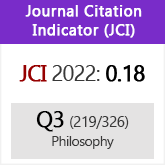Realismo y constructivismo en la teoría moral kantiana: el ejemplo de la ética del discurso
DOI:
https://doi.org/10.3989/isegoria.2002.i27.557Abstract
In this paper I argue against the metaethical view of moral Kantianism as a form of constructivism or antirealism. Given that Kantians do not share the expressivism characteristic of standard moral antirealism, Kantian constructivism seems to be an inherently unstable position, which can only be fully developed into either a consistently antirealist or a consistently realist approach. Taking Habermas’ discourse ethics as an example, I contrast a realist with an antirealist interpretation of the principle of universalization, and try to show that only the former is compatible with the moral cognitivism characteristic of Kantian moral theory, whereas the latter unavoidably leads to a decisionist (i.e., relativist) approach.
Downloads
Download data is not yet available.
Downloads
Published
2002-12-30
How to Cite
Lafont, C. (2002). Realismo y constructivismo en la teoría moral kantiana: el ejemplo de la ética del discurso. Isegoría, (27), 115–129. https://doi.org/10.3989/isegoria.2002.i27.557
Issue
Section
Articles
License
Copyright (c) 2002 Consejo Superior de Investigaciones Científicas (CSIC)

This work is licensed under a Creative Commons Attribution 4.0 International License.
© CSIC. Manuscripts published in both the printed and online versions of this Journal are the property of Consejo Superior de Investigaciones Científicas, and quoting this source is a requirement for any partial or full reproduction.All contents of this electronic edition, except where otherwise noted, are distributed under a “Creative Commons Attribution 4.0 International” (CC BY 4.0) License. You may read here the basic information and the legal text of the license. The indication of the CC BY 4.0 License must be expressly stated in this way when necessary.
Self-archiving in repositories, personal webpages or similar, of any version other than the published by the Editor, is not allowed.














